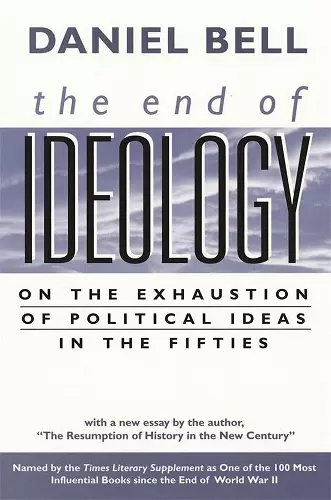The End of Ideology
On the Exhaustion of Political Ideas in the Fifties, with "The Resumption of History in the New Century"
Format:Paperback
Publisher:Harvard University Press
Currently unavailable, and unfortunately no date known when it will be back

A very polished book. The overall argument on the relationship of declining religious and rising national feeling is highly appropriate and particularly significant. Bell is obviously completely conversant with recent work by Habermas, Chartier, Gordon, Baker, and Crow, to name but a few authors whose findings he weaves into his own purpose. I was also taken with his thought on the relationship between national feeling in France and the awareness of France's changing place in the world, and with that, of Britain's surprisingly swift advance from 1688 to the middle decades of the eighteenth century. His pages on 'Great Men' as the vehicles of national sentiment are likewise very thoughtful. -- Patrice Higonnet, author of Goodness Beyond Virtue Praise for earlier editions: The End of Ideology was one of the most influential, most controversial, and most misunderstood books about the 1950s. But it is not simply a central text of the intellectual history of those years (although it certainly is that). It is also a provocative discussion by one of America's most creative thinkers of political and philosophical issues that concern us still. -- Alan Brinkley No one could consider himself politically literate without an intimate knowledge of the issues foreseen in The End of Ideology. -- Theodore Draper
The End of Ideology has been a landmark in American social thought, regarded as a classic since its first publication in 1962. Daniel Bell postulated that the older humanistic ideologies derived from the nineteenth and early twentieth centuries were exhausted, and that new parochial ideologies would arise.
Named by the Times Literary Supplement as one of the 100 most influential books since the end of World War II, The End of Ideology has been a landmark in American social thought, regarded as a classic since its first publication in 1962.
Daniel Bell postulated that the older humanistic ideologies derived from the nineteenth and early twentieth centuries were exhausted, and that new parochial ideologies would arise. In a new introduction to the year 2000 edition, he argues that with the end of communism, we are seeing a resumption of history, a lifting of the heavy ideological blanket and the return of traditional ethnic and religious conflicts in the many regions of the former socialist states and elsewhere.
A very polished book. The overall argument on the relationship of declining religious and rising national feeling is highly appropriate and particularly significant. Bell is obviously completely conversant with recent work by Habermas, Chartier, Gordon, Baker, and Crow, to name but a few authors whose findings he weaves into his own purpose. I was also taken with his thought on the relationship between national feeling in France and the awareness of France's changing place in the world, and with that, of Britain's surprisingly swift advance from 1688 to the middle decades of the eighteenth century. His pages on 'Great Men' as the vehicles of national sentiment are likewise very thoughtful. -- Patrice Higonnet, author of Goodness Beyond Virtue
Praise for earlier editions:
The End of Ideology was one of the most influential, most controversial, and most misunderstood books about the 1950s. But it is not simply a central text of the intellectual history of those years (although it certainly is that). It is also a provocative discussion by one of America's most creative thinkers of political and philosophical issues that concern us still.
No one could consider himself politically literate without an intimate knowledge of the issues foreseen in The End of Ideology. -- Theodore Draper
Originally published in 1960, this collection of essays focuses on the protean nature of American society and the decay of Marxism and other systematic ideologies in the West...Arthur Schlesinger Jr. [has] admired the book's 'unflagging confidence, trenchancy, and authority.' -- Scott Veale * New York Times Book Review *
ISBN: 9780674004269
Dimensions: 210mm x 140mm x 30mm
Weight: 581g
540 pages
5th New edition